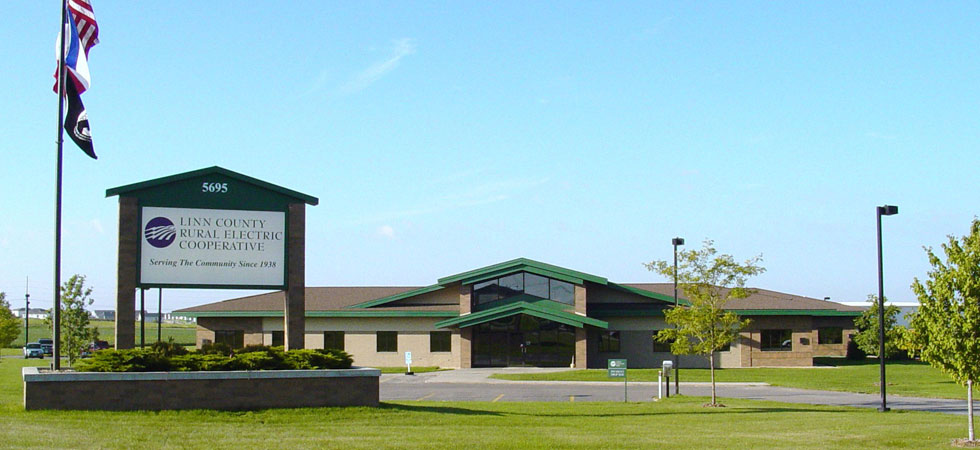About Us
Linn County Rural Electric Cooperative (REC) is a not-for-profit, member owned electric distribution cooperative serving more than 33,200 members in portions of six counties in eastern Iowa. Our membership includes residential and commercial accounts in rural and suburban areas of Linn and Johnson counties with line extensions into Jones, Cedar, Iowa and Benton counties.
Mission Statement
Linn County REC is committed to providing our members with safe, reliable, cost effective, sustainable electricity and excellent member service.
The Cooperative Difference
COOPERATIVES ARE LOCALLY GOVERNED: We are led by consumers like you who understand and listen to the community while looking out for the long-term needs of their members. Members elect fellow members to represent them on the board of directors every September at our annual meeting.
COOPERATIVES BELONG TO THE COMMUNITIES THEY SERVE: Cooperatives operate at cost. When there are profits that exceed the amount needed to operate the cooperative, they go back to our members, in the form of capital credits. The credit is reflected on your September bill statement based on your usage. We have returned over $21 million dollars in captial credits since our incorporation in 1938.
COOPERATIVES WERE BUILT BY THE COMMUNITIES THEY SERVE: While there are many similarities between cooperatives, they all make their own business decisions independently. No two cooperatives are alike. That's because every cooperative is shaped over time by the community it serves, each with specific needs.
Cooperative Principles
Cooperative businesses are special because they are owned by the consumers they serve and because they are guided by a set of seven principles that reflect the best interests of those consumers. All cooperative businesses adhere to these seven guiding principles:
- Voluntary and Open Membership — Cooperatives are voluntary organizations, open to all persons able to use their services and willing to accept the responsibilities of membership, without gender, social, racial, political, or religious discrimination.
- Democratic Member Control — Cooperatives are democratic organizations controlled by their members, who actively participate in setting policies and making decisions. The elected representatives are accountable to the membership. In primary cooperatives, members have equal voting rights (one member, one vote) and cooperatives at other levels are organized in a democratic manner.
- Members’ Economic Participation — Members contribute equitably to, and democratically control, the capital of their cooperative. At least part of that capital is usually the common property of the cooperative. Members usually receive limited compensation, if any, on capital subscribed as a condition of membership. Members allocate surpluses for any or all of the following purposes: developing the cooperative, possibly by setting up reserves, part of which at least would be indivisible; benefiting members in proportion to their transactions with the cooperative; and supporting other activities approved by the membership.
- Autonomy and Independence — Cooperatives are autonomous, self-help organizations controlled by their members. If they enter into agreements with other organizations, including governments, or raise capital from external sources, they do so on terms that ensure democratic control by their members and maintain their cooperative autonomy.
- Education, Training, and Information — Cooperatives provide education and training for their members, elected representatives, managers, and employees so they can contribute effectively to the development of their cooperatives. They inform the general public, particularly young people and opinion leaders, about the nature and benefits of cooperation.
- Cooperation Among Cooperatives — Cooperatives serve their members most effectively and strengthen the cooperative movement by working together through local, national, regional, and international structures.
- Concern for Community — While focusing on member needs, cooperatives work for the sustainable development of their communities through policies accepted by their members.
